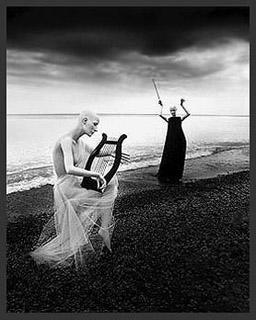Research Project C7. Inspiration and Subversion: Artistic Creation as Aesthetic-Religious Experience
Head
Research Associates
Dr. Mario Bührmann / Hans Stauffacher, M.A.
Jun.-Prof. Dr. Beatrice Trînca / Dr. des. Marie-Christin Wilm
Student Assistants
Gabriela Daedelow / Matthias Flaig
Objective
Beginning with the philosophical aesthetics of the 18th century, aesthetic experience has been understood primarily as the experience of art by non-artists. In consequence, reflections on art shifted their emphasis from artist to receiver. At the same time, a tradition that defined the production of art itself as a form of reception faded from view – a tradition that had been continuously effective ever since ancient Greek religion and philosophy and that has by no means vanished from modernity. This leads to the main question of the project: How was the traditional conception of art production as a form of art reception reconfigured in modernity, and which were the consequences of this reconfiguration for the concept of ‘aesthetic experience’? This question would seem to presuppose an attenuation of the religiously based conception of art as creation. The degree to which this is the case is being explored by the project, with its orientation toward the aesthetics of the religious, on the basis of investigations of modern and pre-modern literary and philosophical texts. From this task emerges the concentration on two guiding concepts: first, the traditional concept of the genesis of art via inspiration, and second, the concept of subversion that has been applied to the process of artistic production only recently and circumscribes the undermining or even destruction of traditional prescriptions. Two interdependent hypotheses will be examined here: 1) that in the aesthetics of reception, notions of inspiration operate primarily within a Christian pattern, and 2) that in the aesthetics of production, self-referential definitions of inspiration attempt to subversively undermine this pattern.
Subproject 1: ‘Poeta Creator’ As ‘Poeta Doctus’. Transformations of Inspiration in Modernity
(Prof. Dr. Renate Schlesier)
The aim of this project is better to understand the transformations which the concept of inspiration has undergone in the modern era. The basic assumption is that many modernist authors conceived of themselves as both ‘poeta creator’ and ‘poeta doctus’; and that they subverted traditional ideas of inspiration. The central question is how such ways of dealing with inspiration relate to a poetic process, frequently considered characteristic of modernism, which brings together poetic creation with reflections about poetic language and/or poetic production. Proust, for whom this poetic process is particularly instable, forever an experiment, is of major interest here. His work will serve as test case in the analysis of the connections, within creative processes, between ecstatic experiences of dissolution of boundaries of self and time and the play with enigma and mystery, on one hand, and claims to truth, regularity and scientific objectivity, on the other.
Subproject 2: Productive subjectivity. Concepts of artistic genius in idealist and post-idealist German philosophy
(Hans Stauffacher, M.A.)
Beginning with Fichte the notion of a self-setting productive subjectivity becomes a central philosophical figure of thought and – following the shift from Kantian aesthetics to a philosophy of art which focuses on an aesthetics of production – concepts of genius acquire a central role for philosophy. Based on this observation the subproject examines theories of artistic creation in 19th century German philosophy that appropriate 18th century concepts of genius, which are in close dialogue with ideas of inspiration derived from Platonic and Christian thought, and conceptualise artistic creation as a process that is at the same time poetic and philosophical. The analysis is guided by the following questions: which connections can be detected between models of artistic creation which are based on concepts of genius and reflections on philosophy as construction, production, creative act or poetic creation? What is the relation between such models of artistic creation and traditional concepts of inspiration? Do these concepts of genius have any potential for subversion vis-à-vis idealist aspirations to a universal rational system? And if so, how is it deployed?
